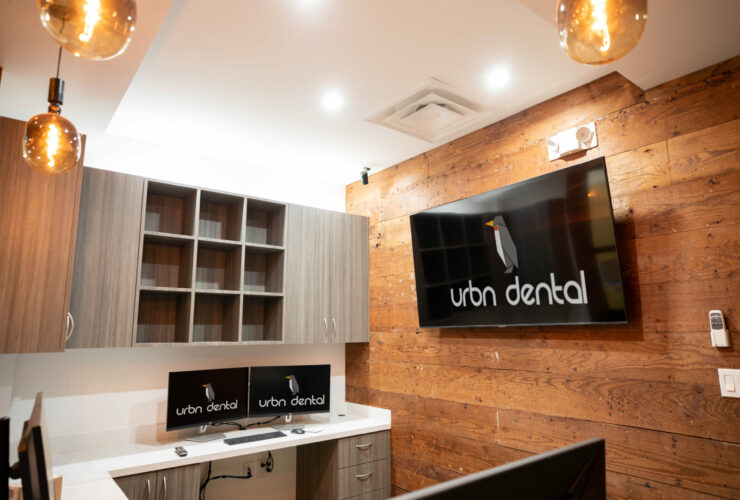Houston Dental Emergency
Dental pain is never fun. Luckily, URBN Dental sets time aside daily for emergency dental cases to ensure patients stay out of pain and keep smiling.
What Is A Dental Emergency?
According to the Cleveland Clinic, a dental emergency is a dental problem that requires same-day dental attention to preserve oral health and to keep patients out of pain.
Not all dental issues are emergencies. Symptoms of a probable dental emergency are:
- Persistent pain that’s unaffected by pain medication
- Bleeding that won’t stop
- A tooth or dental restoration falling out
- Suspicion of broken facial bones
Important note: If you suspect broken facial bones, visit the nearest emergency room.
Immediate Actions To Take
First Aid for Dental Emergencies
First aid for a knocked-out tooth includes:
- Using gauze to stop any bleeding
- Locating the tooth and being careful not to touch the roots
- Rinsing the tooth with cow’s milk
- Putting the tooth back in the socket
- If the tooth doesn’t fit back into the socket, put the tooth in cow’s milk
- Seeking emergency dental services ASAP
Are you having a dental emergency in Houston, Texas? Book an appointment online at URBN Dental today.
Common Dental Emergencies
Toothache
Tooth pain ranges from a dull ache to excruciating pain. When it’s the former and pain medication isn’t helping, something is wrong. Getting to an emergency dentist can solve the problem and ease the pain.
Broken Or Chipped Tooth
A small chip may not always be a dental emergency. According to the Cleveland Clinic, a severe crack or sizable chip can be painful and leaves the tooth vulnerable to bacterial infection, which can be serious when left untreated.
Knocked-Out Tooth
A permanent adult tooth falling out is always a dental emergency. Getting the tooth to the dentist immediately is the only way to make reimplantation possible and successful.
Lost Filling Or Crown
When a filling or crown falls out, it is best to get to the dentist as soon as you can because the remaining tooth isn’t strong enough to be left unprotected. After you call the emergency dentist, the Cleveland Clinic recommends:
- Lost dental crown: Try to locate the crown, rinse it off with clean water, and see if you can get it to stick back in with dental cement, denture adhesive, or toothpaste. DON’T use household glues.
- Lost fillings: Coat the tooth with dental cement or put a piece of sugar-free gum in the hole until you get to the dentist.
Abscessed Tooth
An abscessed tooth is caused by an untreated cavity that leads to a bacterial infection spreading to the gums. If left untreated, the infection can spread to the jaw and the rest of the body. Symptoms include:
- Pain that is throbbing and continuous
- Temperature sensitivity
- Fever
- Face swelling
- Tender and/or swollen lymph nodes
- An unpleasant smell
An impacted wisdom tooth is another probable cause. You will likely be in emergency wisdom tooth pain and require immediate care.
Soft Tissue Injuries
Soft tissue injuries include cuts to your lips, cheeks, or gums.
Steps to take during a dental emergency to stop the bleeding include:
- Rinsing your mouth with warm salt water
- Applying a moist piece of gauze or a tea bag to the affected area for 15-20 minutes
- Applying a cold compress to the outside of your cheek for 5-10 minutes
If the bleeding doesn’t stop, continue holding gauze on the wound and get to the dentist or emergency room ASAP.
Post-Emergency Care
Follow-Up Care And Recovery Tips:
It’s always important to follow your dentist’s recommendations for follow-up care. If you’ve had dental surgery, such as tooth extraction, following post-surgical care is crucial for avoiding infection and pain.
According to the Mayo Clinic, the following is recommended after having teeth extracted:
- Pain management: Holding cold packs to the outside of your cheeks after surgery can assist with pain and swelling. Take pain medications as directed.
- Rest: Resting the day of/after surgery and avoiding strenuous activity for up to a week is the best way to prevent dry sockets (a painful condition where the blood clot at the surgical site comes loose, exposing the nerves/bone).
- Drink water, but NOT through a straw: Staying hydrated will assist with healing, but avoid using a straw for a week (the sucking motion puts strain on the surgical site).
- Eat soft food: Eat soft foods, such as apple sauce, yogurt, mashed potatoes, etc. for several days. Avoid crunchy, hard, and chewy foods completely until fully healed.
- Keep your mouth clean: Follow your dentist’s recommendations for keeping the surgical site clean. Rinse your mouth every time you eat, resume usual brushing, floss on day two (avoiding the surgical site), and use an antibiotic mouthwash one to two times a day.
- Take all follow-up medication as directed: Dentists often prescribe cautionary antibiotics after tooth extraction. Take all of them as directed, even when you feel better.
- Avoid: Tobacco, caffeine, alcohol, and carbonated or hot beverages should be avoided for a week.
FAQ
Where Do I Go For A Dental Emergency?
Finding an emergency dentist near you, such as URBN Dental, is the fastest way to get emergency dental care.
Is A Loose Dental Implant An Emergency?
Yes. According to the U.S. Food and Drug Administration (FDA), if a dental implant feels loose or is causing you any pain, you should call the dentist immediately.
Whether it’s a chipped tooth, a lost filling, or an immediate need for tooth extraction in Houston, URBN Dental can find a solution.
Sources:
Cracked Tooth (Fractured Tooth). (2024).
Dental Emergencies. (2022).
Dental Implants: What You Should Know. (2021).
Dry socket. (2023).
Tooth abscess. (2022).
Tooth loss: First aid. (2024).
What To Do If Your Filling Falls Out: Don’t Panic, Just Call The Dentist. (2023).








